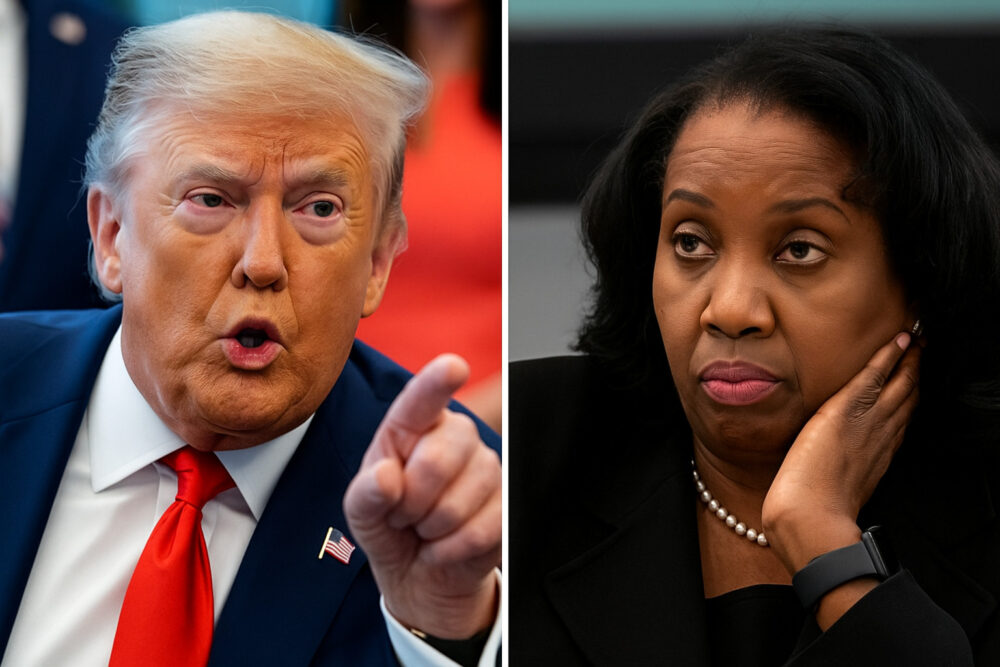Federal Reserve Governor Lisa Cook is preparing to file a lawsuit against President Donald Trump after he announced her removal from the central bank, igniting a potential legal and institutional clash over the Fed’s independence.
Cook’s attorney, Abbe David Lowell, argued that the president does not have the legal authority to dismiss her. “President Trump has no power to remove Federal Reserve Governor Lisa Cook,” he stated.
Trump defended his action by citing alleged false statements in Cook’s mortgage application and claiming his constitutional authority gave him the right to remove her.
The move has rattled markets, with investors selling off long-term U.S. government bonds on Tuesday. The reaction signaled growing concern about political interference in the Federal Reserve, which could undermine the bank’s credibility and raise borrowing costs for the U.S. government. Such changes would likely ripple through global markets, given the role U.S. rates play in determining asset prices worldwide.
Cook, one of the seven governors on the Fed’s board and a member of its powerful 12-person committee that sets interest rates, dismissed the president’s claims. “His attempt to fire me, based solely on a referral letter, has no factual or legal foundation,” she said. Her legal team confirmed a lawsuit will soon be filed to contest what they describe as an unlawful decision.
The Federal Reserve itself emphasized that its governors can only be removed “for cause,” under terms outlined by Congress in the Federal Reserve Act. The institution underscored that long terms and removal protections exist to safeguard monetary policy from short-term political influence. The bank said it would comply with any ruling the courts hand down.
Trump, however, hinted at plans to nominate a replacement, telling reporters he already had “good people” in mind. “We need individuals who are 100% above board, and it doesn’t seem like she was,” he said.
Cook was appointed in 2022 by President Joe Biden, becoming the first African American woman to serve on the Fed’s board. Her potential dismissal could set the stage for a court battle over presidential authority and the central bank’s independence.
Trump’s push to remove Cook comes as he continues to pressure Fed Chair Jerome Powell, whom he has openly criticized for not lowering interest rates more aggressively. Analysts warn that reshaping the Fed’s leadership to favor Trump’s economic agenda could weaken the institution’s credibility and global trust in U.S. markets.
Cook has rejected accusations of mortgage fraud, which originated in a letter from housing finance regulator Bill Pulte, a Trump ally, to Attorney General Pam Bondi. The letter alleged conflicting statements in loan documents for properties in Michigan and Georgia. Trump seized on the allegations in a Truth Social post, arguing Cook had knowingly made contradictory declarations.
Cook said she only learned of the claims through the media, describing them as politically motivated and irrelevant to her role at the Fed. “I will not resign. I will continue fulfilling my duties to support the U.S. economy, as I have since 2022,” she stated, insisting she would provide accurate information to address the matter.
The escalating dispute between Trump, Cook, and Powell has revived debate over whether the Fed can remain insulated from political pressure. Economists argue that central banks must maintain independence to ensure decisions are made in the public interest rather than to serve political goals.
The controversy briefly unsettled financial markets: European indexes opened lower, U.S. bond yields climbed, and the dollar slipped against major currencies before recovering.
Julia Lee, head of client coverage at FTSE Russell, summed up the stakes: “The real question for investors is whether Trump succeeds in removing Cook. If he does, could he reshape the Fed’s composition—and how would that affect global confidence in the U.S. economy?”















